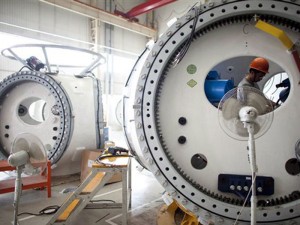China’s ‘solar city’ rushes to catch power boom
BAODING, China — Solar panels jut out of streetlights in China’s self-proclaimed Clean Energy City. Tiny wind turbines twirl atop public buildings. Schools are due to teach students about “green living.”
In the scramble to profit from demand for clean energy, this city southwest of Beijing is promoting itself as a manufacturing center for solar, wind and other gear by transforming into a living showcase of environmental technology.
“Baoding is following a path of ecological civilization,” a deputy mayor, Zhou Xingshi, told a group of visiting reporters.
Baoding illustrates the intensity of Chinese government efforts to profit from rising global demand for clean energy. Communist leaders are promoting solar, wind and hydropower to curb surging demand for imported oil and gas and see technology exports as a route to cleaner growth and higher-paid jobs.
Chinese utility companies are required to install wind turbines and Beijing has promised to pay part of the cost of solar equipment — a strategy that is driving the rapid growth of Baoding and other supply centers.
China led the world in clean energy investment last year at $54.4 billion, up 39 percent from 2009, according to a March report by the Pew Charitable Trust. Worldwide, investment rose 30 percent to $243 billion.
Baoding, 90 miles (150 kilometers) from the Chinese capital in the table-flat farmland of Hebei province, started billing itself as a renewable energy center in 2002 after the success of Yingli Green Energy Co., a local startup founded in 1987 that grew into a major supplier of solar panels. City leaders officially declared Baoding a “Clean Energy City” in 2006.
Today, Baoding has two government research labs and 170 companies that produce clean power equipment. They include Zhonghang Huiteng Windpower Equipment Co., one of the biggest makers of wind turbine blades. Other fields targeted by Baoding for development include batteries and power transmission.
Baoding’s clean energy companies had 45 billion yuan ($7 billion) in revenue last year, according to the city government. It says the local industry should grow by 30 percent a year through 2016.
Local authorities work closely with companies, organizing job fairs, providing training and helping to recruit employees through local schools.
Companies also are attracted by Baoding’s “funding resources,” said Lian Shujun, deputy director of the Baoding National New and High-Tech Industrial Development Zone.
Lian gave no details but Chinese companies in favored industries can receive government support ranging from tax breaks and low-interest loans to free rent in business parks.
Such support has prompted complaints by Beijing’s trading partners that the government is improperly subsidizing Chinese companies and hampering market access. The U.S. government said this month Beijing agreed to rescind some policies that American officials said amounted to subsidies to makers of wind turbines.
China already is the world’s biggest producer of solar and wind equipment. Yingli and other Chinese solar suppliers have long competed in global markets because their equipment was too expensive for domestic use. Chinese makers of wind gear are only starting to expand abroad but some domestic producers already are among the world’s biggest due to their vast home market.
The Chinese government says it wants at least 15 percent of the country’s power to come from renewable sources by 2020. It is spending heavily on grants and other aid to propel technology development.
“The Chinese government is very supportive of the green market,” said Liansheng Miao, Yingli’s founder and chairman.
In a sign of high-level endorsement, Yingli received a 36 billion yuan ($5.5 billion) line of credit last year from state-owned China Development Bank.
Miao rejected what he said was the notion that Yingli, a private company with shares traded on the New York Stock Exchange, succeeds due to government support.
“I am an entrepreneur, not a state-owned entity, so the government would not help me,” he said at a news conference. “What we compete on is our innovation and cost structure.”
Yingli’s CFO, Li Zongwei, said it has yet to receive any money from the China Development Bank and will have to submit individual projects to obtain loans. Li said such projects are conducted on “commercial terms.”
Other companies in Baoding say business is booming.
A wind turbine factory owned by China Guodian Corp., one of China’s biggest power generators, expects to sell 1,100 units this year, nearly double 2009’s level of 600, said the factory’s deputy general manager, Wang Hongbin.
Wang said all of his factory’s output of 1.5-megawatt turbines was sold in China, but Guodian also has announced plans to expand to the United States by supplying units for a power project in Corpus Christi, Texas.
“Production definitely will increase,” Wang said, standing beside rows of 130-foot-long (40-meter-long) turbine blades in wooden cradles outside the factory, awaiting delivery to power companies.
Other city government efforts to promote clean energy include installing 110 solar-powered traffic lights, according to Lian, the industrial zone official. New buildings are required to use solar-powered water heaters.
Baoding’s city government launched a joint effort with the environmental group WWF in 2008 to share information on city planning and technology and to develop environmental education programs.
“All citizens in Baoding will be taught about ‘green living’,” he said, “starting with elementary school students.”
